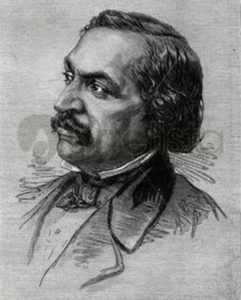
Frank Webb
*Frank Webb was born on this date in 1828. He was a Black novelist, poet, and essayist.
Francis Johnson Webb was born in Philadelphia. He was the fifth and youngest child of Francis Webb and Louisa Burr Webb. Webb had one brother, John, and three sisters, Elizabeth, Ann, and Mary. His parents and older siblings were among thousands of free Blacks who had left the United States in 1824 and returned in 1826 as part of the failed Haitian emigration experiment. Webb's mother, Louisa Charlotte Burr, was an illegitimate daughter of Aaron Burr. This was confirmed via DNA in 2018, is former U.S. Vice President Aaron Burr.
She and her brother John Pierre Burr, a prominent activist in Philadelphia's Black community, were born to an East Indian mother who served in Burr's household as a governess. Louisa Burr Webb worked most of her life for Mrs. Elizabeth Powel Francis Fisher, a prominent Philadelphia society matron closely connected to the oldest Philadelphia families and mother of prominent Philadelphia businessman Joshua Francis Fisher. After Francis Webb's death, Louisa remarried and became Louisa Darius. Webb's father, Francis Webb, served in Philadelphia as an elder in the First African Presbyterian Church, a parishioner at the African Episcopal Church of St. Thomas, a founding member of the Pennsylvania Augustine Education Society formed in 1818, and secretary of the Haitian Emigration Society organized in 1824.
He worked as the Philadelphia distribution agent for Freedom's Journal from 1827 to 1829. While living in Port au Platt, Haiti, from 1824 to 1826, he served on the Board of Instruction of a joint Episcopal-Presbyterian church school. He died of unknown causes in 1829, a year after Frank's birth. Frank Webb worked as a commercial artist in Philadelphia's vibrant community of free Blacks. He married Mary E. Webb, née Mary Espartero, in 1845, at 17. She was born in New Bedford, Massachusetts 1828, shortly after her mother escaped slavery in Virginia. Her father was described as "a Spanish gentleman of wealth [who] had made many efforts to purchase her mother's freedom."
The Webbs traveled to England in 1856, where Mary's dramatic readings garnered further acclaim. The couple received a warm welcome from many British nobles. While in London, Webb asked his friend, Charles Sumner, to write an introductory letter for his wife during her reading tour in Liverpool. In 1857, when Frank Webb was 29, the London firm of G. Routledge and Company published his first and only novel, The Garies and Their Friends. Webb dedicated his book to supporter Lady Noel Byron, who had encouraged him, and Henry, Lord Brougham wrote an enthusiastic introduction. It was published with an additional preface by Stowe. After William Wells Brown, Webb was the second African American to publish a novel.
The international tour had taken a severe toll on Mary Webb's health. On the advice of physicians who recommended a warmer climate, the Webbs then relocated in 1858 to Kingston, Jamaica, where Webb's British friends secured him a job with the postal service. However, Mary Webb died there on June 17, 1859. He continued to live in Jamaica for over ten years, from 1858 to 1869, and remarried before returning to the United States.
Webb's second wife was Mary Rosabelle Rodgers, the daughter of a Jamaican merchant. They had four children before moving to the United States in 1869, where they had two more children. From late 1869 through 1870, Webb lived in Washington, DC, where he resumed writing. Webb published several essays, poems, and novellas for the African American journal The New Era. While in Washington writing, Webb lived with his niece, teacher Sara Iredell, who had recently married Christian Fleetwood.
Later, in 1870, the Webbs moved to Galveston, Texas, which had developed a vibrant black community after the American Civil War. In 1876, Webb served as an alternative delegate to the Republican state convention. Webb worked in Galveston first as a newspaper editor, then as a postal clerk, and finally for thirteen years as principal of the Barnes Institute, a segregated school for "colored children." Frank Webb died in Galveston, Texas, in 1894.
In the later 20th century, with a renewed appreciation for the works of nonwhite authors, Webb's novel was reprinted in 1969 and critically appraised. (It was published in a new edition in 1997.) His was the first novel by an African American to focus on the lives of free Blacks in the North rather than those in slavery. It was the first "to treat passing for white in great depth and show white mob violence against Blacks in the North."